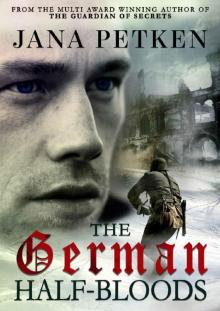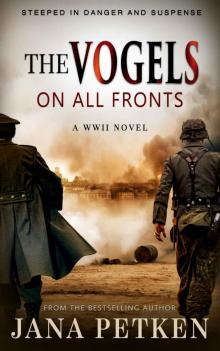- Home
- Jana Petken
The German Half-Bloods (The Half-Bloods Trilogy Book 1) Page 29
The German Half-Bloods (The Half-Bloods Trilogy Book 1) Read online
Page 29
Leitner was bucking ferociously, struggling to get Dieter’s knee off the centre of his back and his hair out of Paul’s clenched fist.
Max kicked Leitner in the ribs, but his muffled groan was almost inaudible as Paul pushed his face deeper into the rug.
“The gun is on you, Leitner. Stop moving – Paul, your tie.”
Paul unclenched his fists, releasing Leitner’s hair. Then he followed Max’s instructions.
After Paul had tied Leitner’s wrists together behind his back, he rummaged through his bag and pulled out a pair of clean underpants. “These should shut him up.”
Max handed the gun to Dieter. “Shoot him if he even looks at you in the wrong way,” he said rolling Leitner onto his back.
Max stuffed the pale-blue briefs between Leitner’s teeth. “I have questions for you, Hauptsturmführer August Leitner of the Abwehr Intelligence Services. Answer them, and I might let you live.”
Chapter Forty-Two
Max was formulating a plan, but he was loath to speak it aloud until he’d taken it from A to Z in his mind; one misstep, one moment of panic or a suggestion of failure, and Paul would fall apart.
“What the blazes are we going to do with him?” Dieter asked.
Max, deep in thought, stared at Leitner’s stuffed mouth with half of the blue cotton underpants sticking out the side of it. “I’m going to remove your gag, Hauptsturmführer, but if you as much as whimper I’ll shove it all the way down your throat and leave it there. Understood?”
Leitner nodded, and as soon as his mouth was free, he shifted his eyes to Paul. “I didn’t suspect this … I didn’t see it … how could I have? How could anyone?” He looked again at the two brothers, his fascination apparently overshadowing his fury. “Which one of you worked with me last night?”
Paul opened his mouth, but gave way to Max when he said, “How did you get here, Leitner?”
“In my car.”
“Did someone drive you?”
Leitner didn’t respond.
“Where is your car?” Max tried again.
Dieter, who was watching the door and window, asked again, “What are we going to do with him? He’ll have your mother arrested before we make it back to her.”
“Father, let me handle this,” Max said in English before switching back to German for Leitner’s benefit. “Where is your car parked?”
“Why should I tell you? You’re going to kill me anyway.” Leitner looked up at Max a moment longer and then nodded. “You’re the brother who lives in England, aren’t you? Paul Vogel doesn’t have the balls to handle a situation like this. Nein, you’re the boss. What are you? Military? Intelligence?” He turned his head to the right and gazed at Paul. “Does your brother know you have a weak stomach? Have you pissed your trousers yet?”
For that, Leitner received a resounding slap around his ear from Max. “Father, get Kurt to bring the car around to the window. Now, Papa, and for God’s sake try to look as though this is just another day.”
After Dieter left, Max asked again, “Where is your car?”
Leitner said, “If I tell you, will you give me your word not to kill me? We can be civil about this, can’t we?” Then he focused on Paul. “Leave me here like this … or tie me to the bed … knock me out if you want. By the time I’m found you’ll be well on your way. I won’t come after you or your parents; you have my word. You don’t need to kill me, Paul. This isn’t who you are.”
“Tell us where your car is, and my brother might be lenient,” Paul said.
Leitner shot a hopeful look at Max. “It’s in the lane just before the turning to the Inn…”
“Thank you.” In a heartbeat, Max straddled Leitner’s stomach and then wrapped his hands around his victim’s throat.
Leitner flinched with sudden terror as Max took his neck in both hands and began to crush it.
“Max, no!” Max heard Paul’s plea but ignored it, squeezing Leitner’s neck, tighter and tighter.
Leitner’s face reddened, his lips were tinged blue, and his thrashing legs were like scissors banging against the floor.
“For Christ sake, Paul, hold his legs still!” shouted Max.
Blood vessels burst in Leitner’s eyes, flooding them red as they stared up at Max. Unable to defend himself with his arms or legs, he made a futile attempt to escape by rocking his torso from side to side under Max’s weight. Seconds later, however, his eyes rolled upwards and he blacked out.
Max cupped Leitner’s head in his hands, and twisted it to the side with one quick, sharp jerk until his cervical spine snapped. “Thank you, for your cooperation, Hauptsturmführer,” he said, getting to his feet.
******
Leitner’s eyes stared sightlessly up at the ceiling. His blue, swollen tongue protruded from between his lips, an expression of shock still planted on his face. Dismayed by what he’d witnessed, Paul saw Max in a frightening new light. “Jesus Christ, Max, did you have to kill him? Did you have to enjoy it?”
Max, who was already rifling through Leitner’s pockets looking for the car key, looked up briefly and replied, “Would you rather I’d let him take you? You’d have been shot within hours in a military prison.”
“You murdered him in cold blood.”
“I’ve saved our lives.” Max finally looked at Paul. “Don’t feel guilty about this piece of trash. You didn’t kill him, I did.”
Paul wiped the sweat from his eyes. “I’m glad the bugger’s dead. I’m just worried about how we’re going to get away with it.”
Dieter came back into the room, shut the door and stared down at Leitner’s body.
“Father, Max had to do it.”
“I know, Son.” Dieter surprised Paul and Max with his calm answer and shocked them further when he added, “I would have done it myself had I not been sent out of the room. Kurt will be here in a minute. I presume we’re putting Leitner in the boot?”
Paul watched Max strip the jacket off Leitner’s body, and tried to guess the next part of the plan if one existed. “What are we going to do now?” he asked, unable to gauge Max’s intentions.
Max handed the jacket to Paul and then began to undo the dead man’s trouser buttons. “He’s blond, our height and build. He walked in here on his own two legs and he’s going to walk out of here the same way, head down and straight out the front door.”
Dieter began to pack what little they had with them into the overnight bags while Paul helped Max finish undressing Leitner. The Vogels’ car was right outside the window and Kurt sat behind the wheel looking like the sangfroid man he was. Nothing seemed to faze him. Laura found him to be a cold, unresponsive man, and she was often resentful of his closeness to her husband. Dieter, however, went to great lengths to make Kurt feel one of the family.
Paul, now back in his own uniform, went to the window, raised the bottom pane as high as it would go and clambered out. Then, he and Kurt scanned the area. “All clear.” Paul nodded. Max and Dieter picked Leitner up between them, handing his body through the window to Kurt and Paul. They then threw Leitner into the boot, and closed it.
Paul climbed back into the bedroom, but he still hadn’t dared ask what they were going to do if and when they got out of the Brandenburg area. He presumed that Max had a plan to dump the body, but he was loath to ask his brother anything, for he seemed to be going through some sort of ritual in front of the mirror, opening and closing his mouth and mumbling to himself as he knotted Leitner’s tie. Maybe he was taking on Leitner’s persona; maybe he’d done this sort of thing a thousand times? Paul also noted that their father was unusually placid. He was silent, nodding when ordered to do something, and stranger still, he had not admonished Max for committing murder. His father was an inscrutable stranger at times, and after what he’d just witnessed, so too was Max.
Two composed men who looked as though they habitually murdered people, stood together in the hotel bedroom, in sharp contrast to Paul, who was a wreck, completely overawed by the situation and t
errified of being caught.
Max turned finally from the mirror, fully dressed in Leitner’s uniform. He outlined his plan swiftly and succinctly. He would drive towards Berlin in Leitner’s car. Kurt, Paul and Dieter were to follow behind in the family vehicle. When they were a fair distance from Brandenburg, Max would find a suitable spot and set fire to Leitner’s vehicle with the body in the driver’s seat. It seemed sound enough, Paul thought, but it’d only take one person to spot them to finish the whole family off in one clear-cut Nazi swoop.
Max adjusted Leitner’s cap, then headed for the door. “Leitner didn’t seem the friendly sort, so I should be able to walk straight through the reception hall and out the front door without having to speak to the person at the desk,” he said, pulling the brim down as far as it would go. “Father, have you settled your bill?”
“Yes, I did it when I went to look for Kurt. There’s a young woman behind the desk, and after I gave her the money for the stay, she seemed more interested in reading a magazine than watching what I was doing, or where I was going.”
Max nodded. “I’ll go first. You and Paul wait fifteen minutes before you leave. I’ll walk up the drive to the main road and then head for Leitner’s car using the trees for cover. If he lied to us, and I spot SS soldiers anywhere near, I’ll double back to the top of the Inn’s driveway, and you can pick me up there – we’ll just have to find another way to get rid of the body.”
“Shit, Max,” Paul blurted out. “You sound as though you’ve done this sort of thing a hundred times. Who the hell are you?”
Max, trying to reassure Paul, said, “I’m guessing Leitner came here alone to take you to Berlin with him. We’ll never know, but I suspect he thought you would go quietly for Mother and Father’s sake. He wasn’t a good spy, Paul, and no to your earlier question, I’m not enjoying myself. Killing people is not my favourite pastime, but at times, it’s a necessary evil. You do know there’s a war going on?”
Chapter Forty-Three
Max walked briskly out of the Inn, his head down as he pushed open the Inn’s double doors. He was confident that the girl behind the desk had only looked up briefly, and at best she’d have only seen his profile.
Minutes after Max’s departure, Paul and Dieter crossed the reception area on their way to the restaurant, where they lingered with mugs of coffee for a good fifteen minutes before getting into their car.
Kurt stopped at the junction at the top of the Inn’s drive, turned left and crawled towards the lane where Leitner’s car was supposedly parked. At the lane’s turning, Dieter instructed Kurt to stop, sighing with relief when he spotted the headlights of Leitner’s car flashing them down. “Thank God. Wait until he gets onto the main road and then follow him.”
Later, when both cars were well on their way to Berlin, Max indicated right and turned into a deserted dirt track bordering a field of grazing cows. Halfway along it, he swerved onto the grassy verge and hit a tree trunk. His head jerked back, causing a shooting pain in his neck. “Sod it,” he cursed, getting out of the vehicle; that wasn’t his brightest idea of the day.
After reassuring Paul and Dieter that he was all right, Max ordered Kurt to turn their own vehicle around to face the main road for a quick exit. It was unlikely that anyone but a farmer would venture down the lane, Max asserted, but privately he was praying that he wouldn’t have to kill anyone else that day.
Max and Paul crouched behind Leitner’s car and began the tedious process of redressing the body in its SS uniform. Max then dressed himself in the civilian clothes that Paul had been wearing earlier.
Once Leitner’s body was in the damaged car’s driver’s seat, Max closed the door, looked in the boot and found an oil rag. He took Leitner’s gold-plated lighter out of his trouser pocket while Paul unscrewed the gasoline cap. Max said, “Our biggest worry will be the tracks we’ll leave in this soft ground.”
“That’s our biggest worry?”
When Paul and Dieter were at a safe distance, Max lit the end of the rag. He was not as confident as he would have Paul and his father believe. He looked at the flame and mumbled, “This plan will have to be good enough.” Then he threw caution to the wind, stuck the lit rag in the gasoline tank, and raced back to the other car just as Leitner’s vehicle ignited in a ball of flame.
******
As the car drove through Berlin towards the area where the Vogel factory was situated, Dieter prepared himself for the inevitable goodbye. Paul had consistently refused to discuss the subject of leaving Germany, and what had begun as a discussion between the twins, had ended in a blazing row. That, plus Max’s reluctance to speak at all after that, had made the atmosphere in the car almost unbearable.
Instead of even attempting to begin a civil conversation, Dieter mulled over the defence he’d use should the Abwehr, SS, or Gestapo turn up at the factory or his house later that day to ask about Leitner. During his musings, however, he felt compelled to air his thoughts. “Even if we’re suspected of seeing Leitner today, the girl at the reception desk will claim that Leitner left the Oro Inn long before Paul and I did. That’s the key.”
“Do you think Rudolph knew about Leitner’s intention to follow you from the hospital?” Paul asked.
“And did Rudolph know who Leitner really was?” Max added. “It seems unlikely that Rudolph or that Heinze fellow, weren’t aware of Leitner’s ocupation.”
Paul disagreed. “I think Leitner was spying on everyone, including Rudolph. Maybe the Abwehr was spying for the Ministry.”
“Either way, if Rudolph knew that Leitner was going to the Oro Inn, the police or SS, or whoever gets involved, will suspect that I was the last person to see him alive,” Dieter pointed out. “They’re bound to put two and two together and ask the girl at the Inn who was there.”
“Don’t lie,” Max suggested. “Tell them you did see Leitner at the Inn, and that Paul decided to travel with you to Berlin instead of Leitner. They won’t find anything to tie you to the car crash. This is going to work, Father.”
When the car was two streets away from the factory, Dieter instructed Kurt to pull over. Then, when the engine was cut, he asked Kurt and Paul to get out. “I want to say goodbye to Max in private. Do you mind, Paul?”
Dieter climbed into the back seat and once alone with Max, his eyes welled up. “Let Kurt drive you to the station, or wherever you feel is a good starting point for your journey. I won’t ask you how you got into Germany or how you’re going to get out; I have a feeling you won’t tell me.”
Max said, “Papa, please don’t tell Mother I was in Berlin.”
“No, of course I won’t.” Dieter shook his head. “Just tell me you have a solid plan.”
“I do. I’ll be fine. Stay calm, Father. Interrogators have a habit of making their suspects feel comfortable by reeling them into casual conversation. Keep your guard up, anticipate the questions, they’ll be subtle to begin with, and don’t hesitate when you give your answers.”
Dieter nodded at the irony of Max’s instructions. He, the dependable Dieter Vogel, was an expert in subterfuge and lies. He’d been practising both every day since joining the Nazi Party and was accomplished in the art of deceit; perhaps a little too skilled.
He looked at Max, swallowing the lump in his throat. In the years to come, he’d regret many things, most of which would be the words and feelings he should have articulated. He was suffocating with self-disgust, but he’d never once come to a decision without considering his wife’s and children’s best interests first. He was also hiding Wilmot’s dire situation in Dachau from Max and Paul, and the hurdles he was jumping to get him out of there. He’d not had the time to defend himself to his boys or to enquire about his darling daughter, and Frank who was like a fourth son. Should he survive to see the world at peace, he’d open up to all his children, but until the dawn of that distant day, he’d remain tight-lipped and fight his war his way.
“You mustn’t worry about me, Son,” Dieter finally answered Max. �
��I just need to know you’ve arrived safely in Britain. Can you get word to me?”
“I’ll try, but it seems unlikely.” Max leant forward and kissed his father’s cheek; it was a cold goodbye and not the affectionate gesture Dieter had hoped for.
“Goodbye, Father. Take care,” said Max, getting out of the car.
“Goodbye, Son – I love you.”
In the street, Max and Paul walked to a shop doorway. It was more discrete than standing on the pavement. “Is there nothing I can say to change your mind?” Max asked Paul.
Paul shook his head. “Look, I know you don’t think I’m capable of dealing with my situation alone, but if you can’t trust me, trust Papa to find a way out of Brandenburg for me. You’ve been hard on him, Max. He’s suffering, too.”
“His conscience might be suffering, but he’s not going to tear up his government contracts, is he?”
“No.”
“Then, that makes him guilty in my book.”
“Will you put his factory in your report?”
Max hesitated. “I should … I want to … I don’t know yet.”
Paul hated saying goodbye to Max. He always got a knot in his stomach, and for days he felt waves of loneliness wash over him. Max felt the same way; he was adept at hiding his feelings from everyone else, but not his twin.
Disappointment played over Max’s face, but that expression was also tinged with anger, “I can’t believe you’re doing this, but whatever trouble you get yourself into, remember Brandt. He’s a sanctimonious old git at times but that’s only because he lives for a bit of drama. The poor sod hasn’t got much else in his life. Go to him if you’re in real trouble, Paul. He’ll always help you.”
“I will, and you remember, Max, I’m not a Nazi and I’ll never be one.”
“I know that, but when this is all over you still may be on the wrong side of history.”
“You have your purpose. Maybe mine is to help the German people,” Paul parried.

 Blood Moon
Blood Moon The Guardian of Secrets and Her Deathly Pact
The Guardian of Secrets and Her Deathly Pact Dark Shadows
Dark Shadows The German Half-Bloods (The Half-Bloods Trilogy Book 1)
The German Half-Bloods (The Half-Bloods Trilogy Book 1) Swearing Allegiance (The Carmody Saga Book 1)
Swearing Allegiance (The Carmody Saga Book 1) The Errant Flock
The Errant Flock The Vogels: On All Fronts (The Half-Bloods Trilogy Book 2)
The Vogels: On All Fronts (The Half-Bloods Trilogy Book 2) The Guardian of Secrets
The Guardian of Secrets Before The Brightest Dawn (The Half-Bloods Trilogy Book 3)
Before The Brightest Dawn (The Half-Bloods Trilogy Book 3) Blood Moon (The Mercy Carver Series Book 2)
Blood Moon (The Mercy Carver Series Book 2) Dark Shadows (The Mercy Carver Series Book 1)
Dark Shadows (The Mercy Carver Series Book 1)